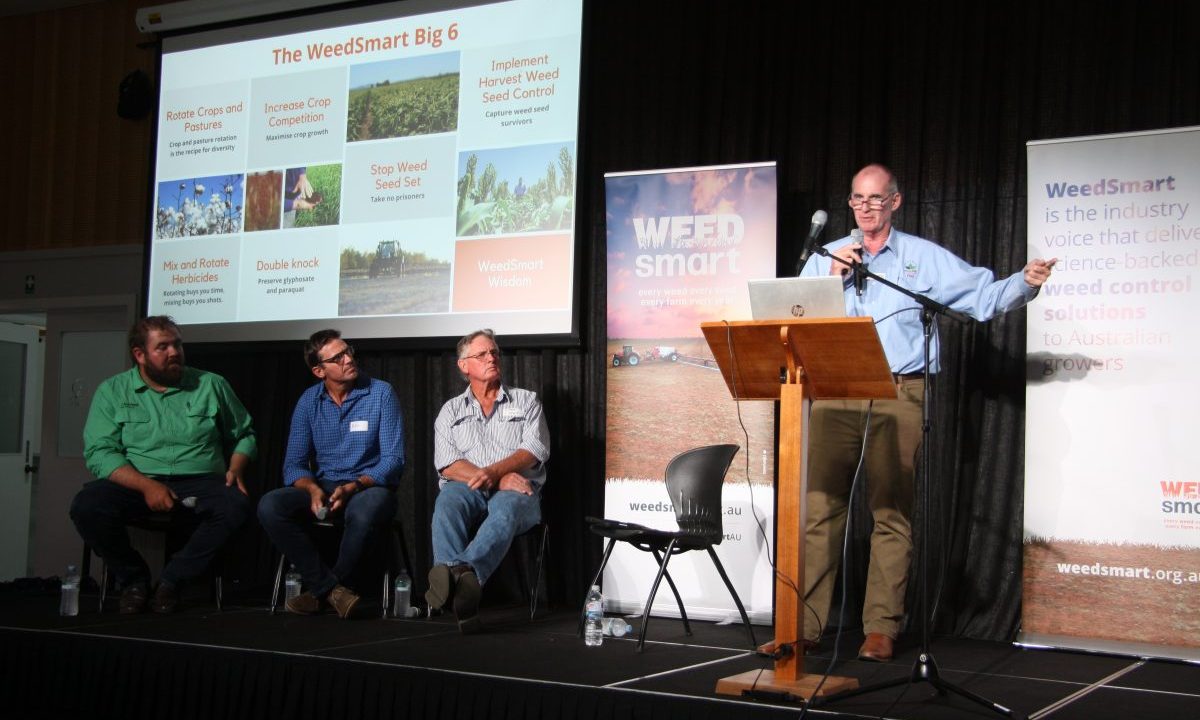
WeedSmart northern extension agronomist Paul McIntosh with panelists (from left) Angus Dalgliesh, Condamine grower Ben Taylor and Jimbour grower St John Kent.
GROWERS and agronomists from across the summer-cropping zone are gathered in Dalby this week to learn about how their peers are keeping on top of weeds using the WeedSmart Big 6, as well as some old and new technology.
The event kicked off with a forum, which included presentations from two Moree agronomists, AMPS Agribusiness’ Tony Lockrey and Nutrien Ag Solutions’ Garry Onus, as well as plenty of representation from north of the border.
Dalby district growers Wade Bidstrup and Angus Dalgliesh shared their stories, as did Condamine growers Jake Hamilton and Ben Taylor, Jimbour grower St John Kent, and Springsure grower Mark Wagner.
The forum was anchored by WeedSmart northern extension agronomist Paul McIntosh, and drove home the WeedSmart Big 6 tactics:
- Rotate crops and pastures;
- Increase crop competition;
- Double knock to preserve glyphosate;
- Mix and rotate herbicides;
- Stop weed seed set; and,
- Implement harvest weed seed control.
Input from MCA Chinchilla agronomist Ed Offner, DataAg director Brendan Griffiths and Dalby grower and agronomist Glenn Milne added further depth to the program.
The day also included a machinery expo and trade display and has been followed up today by on-farm visits to Peter Bach and Wayne Ziesemer, both at Bongeen.
Residuals advance
Attendees heard some success stories about the increased role of residual herbicides in the north, but both growers and advisors said the use of them needs to be judicious in order to not lock growers out of cropping opportunities.
Mr Lockrey said residuals played a part in the “3D game of chess” that is farming, and that double knock provided a high level of control, particularly when a systemic product was applied first.
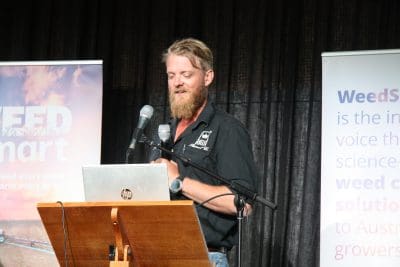
Condamine grower Jake Hamilton speaking at the WeedSmart Dalby event.
With its own research sites in northern NSW, and input from grower members, AMPS has also road-tested numerous double-knock combinations, and spraying some but not all fallows with residuals.
“We’re tending to focus on residuals that give us two or three options and not just one.”
Mr Hamilton said residuals came into their system when agronomist Glenn Milne suggested Flame could keep country clean for three months to eliminate their problem of 2-5mm rainfall events sparking germinations.
This followed an increased grassweed problem in the late 2000s.
“It seemed like three grasses were going to gang up on us and become resistant to glyphosate”.
“The WeedSmart team will tell you you can’t spray your way out of resistance, but boy, did we give it a red hot crack.”
After getting on top of grassweed problems, including tidy-ups with a buggy sprayer, Mr Hamilton said their summer spraying was now minimal.
The family crops nearly 5000ha and aims to be able to spray the whole place in seven days using a John Deere See and Spray system.
Crop rotation fosters control
Mr Taylor grows chickpeas, wheat, and sorghum in rotation including a long fallow.
“We love our chickpeas; I’m a big fan of them.
“Whenever we can, we double crop chickpeas into sorghum stubble.
“We have a five-year cropping plan and we’ve been doing it for 12 or 13 years and it’s never failed.
They apply pre-emergent herbicide with a WeedIt they’ve owned for six years.
“We’re making far more money than we were 10 or 12 years ago.
Mr Taylor said they used to double knock at “big rates, massive rates” and made a change for the better which included using pre-emergent herbicides in June-July.
Spectacular yields recorded in recent months of Sunmax wheat at 6.8t/ha, and sorghum at 5-6t/ha, have helped to galvanise Mr Taylor’s confidence in their system.
“Sorghum isn’t our most economic crop out in the west but we grow it to attack weeds.”
Fleabane, bluegrass appear
Mr Dalgliesh, also an agronomist with Nutrien Ag Solutions Dalby, is part of a family operation that grows wheat, barley and chickpeas over winter and sorghum and mungbeans in summer on country between Dalby and Chinchilla.
They use a quad for spot spraying, and said fleabane was the latest “toughy”.
“That larrikin, he’s only new this year.”
“It’s really set this year because of the wet winter.”
Queensland bluegrass has also appeared.
“It’s becoming more and more of a problem”.
“Every time we go over it and it doesn’t work, we’re developing more and more resistance.
“Like feathertop, it’s tufted and has a really small leaf.”
Most growers spoke about fleabane as being an arrival of recent years that requires careful consideration in the herbicide regime.
Old, new methods work
Mr Wagner farms 2800ha north of Springsure, with sorghum and mungbeans the summer crops, and wheat and chickpeas over winter.
The Wagners use a Weedseeker2 optical spraying system, and in the past 12 months have invested in a SwarmBot as an autonomous solution to the region’s labour shortage.
They also do some tillage to combat the biggest weed problems, namely FTR, as did the Hamiltons to help get their grassweeds under control.
“If you try spraying it out, it constantly drops seeds”.
Mr Bidstrup said feathertop Rhodes grass (FTR) was the biggest weed problem for his system, and spot spraying keeps on top of it.
They also use some 2,4-D to keep on top of fleabane without risking damage to the small number of cotton crops nearby.
The Bidstrups’ rotation can include: barley; canary; chickpeas; corn; faba beans; millet; mungbeans; sorghum, and wheat.
A drone with Single Shot software to generate maps for use in their sprayer has recently been deployed to help control weeds in their rotation.
“We’ve only had it for a few months and…you can tell it to spray weeds of a certain size,” Mr Bidstrup said.
Agronomists were also keen to point out the value of a hoe as a means of killing weeds that had every chance of being resistant to sprays which had killed others of its species on the farm.
- SwarmFarm field service and support staff Ben Conway, Moonie, and Dustin Van Nek, Toowoomba with Hannaford father and son growers Anthony and Caleb Wallis.
- Incitec Toowoomba-based agronomist Bede O’Mara, Elders Qld and NT technical services manager Maree Crawford and Glencar Consulting agronomist and Dalby grower Glenn Milne.
- Wood Ag agronomist Corey Cutler with AMPS Agribusiness Moree agronomists Callum Melton and Amy Larsen.
- Paul McIntosh, Jess Scholle, Jess Strauss, Qld Department of Agriculture and Fisheries principal research scientist Michael Widderick and Junee-based agronomist Greg Condon.
- Killarney grower Scott Petersen and Fraser Agronomy principal Richard Fraser.
- AgNova Brisbane-based area sales manager Scott Sheppard and Janerin Pty Ltd farm manager Damien Ebbern, Condamine Plains.
- Nutrien Ag Solutions Dalby bug checker Tom Little, Pirrinuan grower Tim McVeigh and Dalby Rural Supplies agronomist Trent Davison.
- Macalister grower Scott Moore, and Bayer agronomist Richard Jackman, Toowoomba.
- Agforce grains policy director Ruth Thompson with Queensland Department of Agriculture and Fisheries Toowoomba-based researchers Katrina Stephenson and Greg Harvey.
- Dalby grower Scott Commens and NAB Agribusiness Dalby manager Alicia Gowar.
- Dalby grower Doug Browne, Dacsbro, John Deere product specialist Anton Kowalenko and RDO Equipment Emerald precision farming specialist Richard Weston.
- Single Ag director Ben Single, Wood Ag Chinchilla agronomist Russell Wood, Nutrien Ag agronomist and Dalby grower Angus Dalgliesh and Warra grower Wade Bidstrup.
Grain Central: Get our free news straight to your inbox – Click here

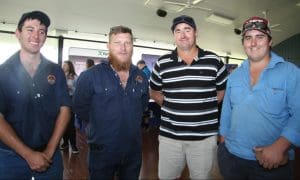
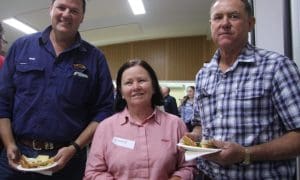
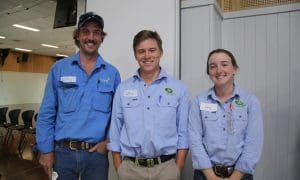


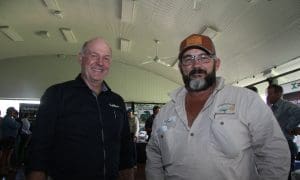
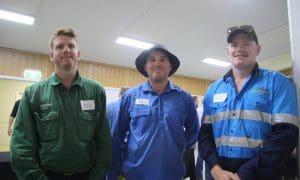
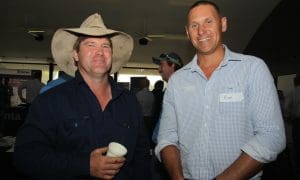
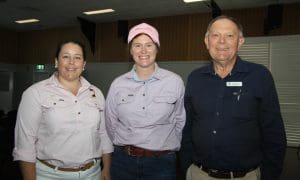
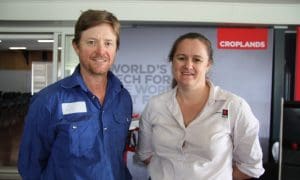

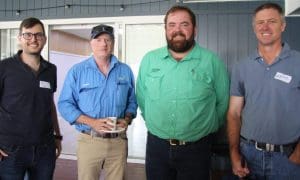


Just wanted to say thanks to Liz for fantastic coverage and great photos of Weedsmart Week at Dalby.
Thanks Liz . 😀👍👍👏👏
Thanks Paul. So much information from a great line-up of speakers to get us all thinking.